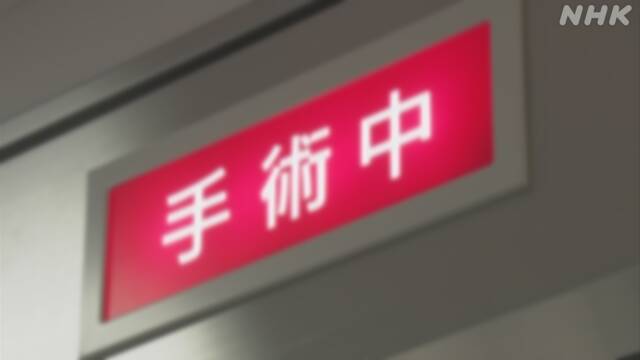The spread of the new coronavirus has hindered the treatment of cancer.
As a result of examining the number of gastric cancer surgeries performed at related hospitals in Kansai since April, the Osaka University Children's Surgical Hospital found that it had decreased by nearly 20% from last year.
Due to the lack of intensive care units due to the lack of intensive care units for accepting critically ill patients with the new coronavirus, the hospital that investigated the survey complained that "the lives that can be saved cannot be saved as it is".
Osaka University Children's Surgical Hospital investigated the number of operations for gastric cancer and colorectal cancer performed from April to the end of last month at a total of more than 40 related hospitals in Osaka and Hyogo prefectures.
As a result, 1007 cases of gastric cancer surgery decreased to 81% of the same period last year, and 2583 cases of colorectal cancer decreased to 89%.
According to hospitals, patients with these cancers who have complications such as myocardial infarction need to continue treatment in the intensive care unit after surgery, but the acceptance of critically ill patients with the new coronavirus has increased and the intensive care unit It means that there is a shortage of nurses and surgery is no longer possible as before.
Approximately 10% of the nationwide surgery for cancer of the digestive system is performed at the hospital where the survey was conducted, and patients who need urgent surgery are transferred to another hospital, and doctors go to perform surgery. It means that the period of using the intensive care unit is reduced to about half of last year.
Yuichiro Toki, president of the Japan Cancer Treatment Society, who is the director of the Osaka University Hospital, said, "The new coronavirus is damaging the entire medical care and cannot be solved by the efforts of the hospital alone. Will definitely have the effect of not being able to help. "
In some cases, patients who are at risk of infection refrain from seeing a doctor.
In many cases, cancer patients refrain from seeing a doctor at their own discretion for fear of being infected with the new coronavirus.
From April to June, before and after the state of emergency was declared, these patients were conspicuous at Osaka University Children's Surveillance Hospital, and some of them had symptoms that made them suspect that the cancer had progressed.
Hirohito Yamaguchi (73), who was diagnosed with stage 3 esophageal cancer at a related hospital, had a feeling of strangeness in his throat since February, but he was diagnosed only in September. did.
Mr. Yamaguchi said, "I thought I'd go to the clinic in April, but I couldn't leave the house because of the state of emergency, and I didn't know if I could go out. When I was diagnosed, my legs trembled with shock. It made me wonder if I couldn't find it a little earlier. "
After that, the cancer was removed by surgery and the treatment was completed, but "I still think that it would have been possible to find it earlier without the new coronavirus and not have surgery, or maybe the stage was lower." I'm talking to you.
Yuichiro Toki, President of the Japan Cancer Treatment Society, said, "I am very worried about what happens to patients who do not come to the hospital because cancer always progresses. I think that some people will stop treatment. I want to provide patients with accurate knowledge and information. "
Delayed diagnosis reduces survival
According to a paper published in the medical journal "Lancet" by British research institutes, the survival rate after 10 years is reduced by 10% or more at most ages when the doctor's diagnosis is delayed by 3 months for general cancer. There is a possibility.
On the other hand, when the CSR Project, an organization that supports cancer patients, investigated the effects of the new coronavirus on treatment in October, 12.9% of patients diagnosed with cancer within 5 years. Replied, "There was a change in the treatment content and schedule."
Of these, 37.5% said they changed it at their own discretion.
In addition, when asked why they changed the treatment content without having their doctor judge it, 76.5% said that they were anxious about nosocomial infections.

